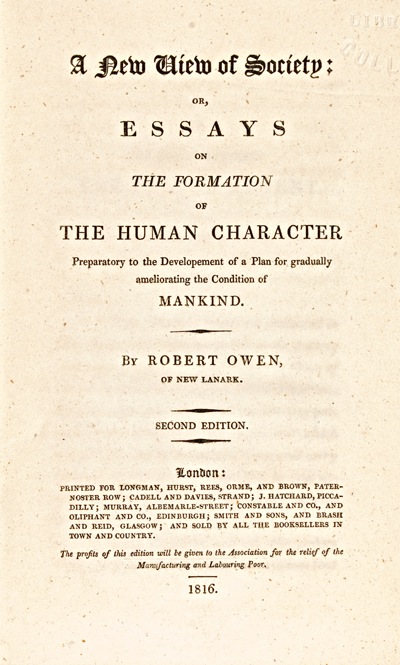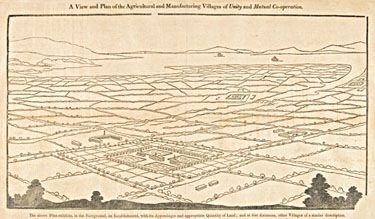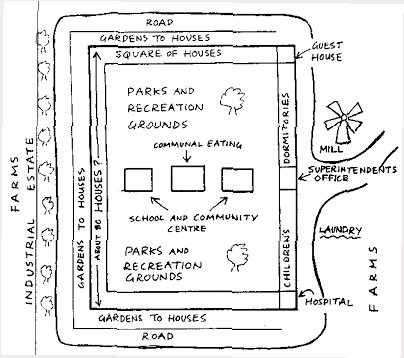Back to Robert Owen Index
Previous
A REVOLUTIONARY VISION

But Owen's vision for the Institution for the Formation of Character went far beyond the immediate project. Margaret Cole describes his speech at the opening of the Institution as the beginning of his 'apocalyptic strain', and the wider philosophy behind his thinking was laid out in uncompromising terms in the third of the essays published in the New View of Society. Here he argues that the whole of existing human culture had been based on a fundamental error which had to be rooted out if a just and moral society was to be established:
'From the earliest ages it has been the practice of the world to act on the supposition that each individual man forms his own character, and that therefore he is accountable for all his sentiments and habits, and consequently merits reward for some and punishment for others. Every system which has been established among men has been founded on these erroneous principles. When, however, they shall be brought to the test of fair examination, they will be found not only unsupported, but in direct opposition to all experience, and to the evidence of our senses.
'This is not a slight mistake, which involves only trivial consequences; it is a fundamental error of the highest possible magnitude; it enters into all our proceedings regarding man from his infancy; and it will be found to be the true and sole origin of evil. It generates and perpetuates ignorance, hatred, and revenge, where, without such error, only intelligence, confidence, and kindness, would exist. It has hitherto been the Evil Genius of the world. It severs man from man throughout the various regions of the earth; and makes enemies of those who, but for this gross error, would have enjoyed each other's kind offices and sincere friendship. It is, in short, an error which carries misery in all its consequences.
'This error cannot much longer exist; for every day will make it more and more evident that the character of man is, without a single exception, always formed for him; that it may be, and is, chiefly created by his predecessors; that they give him, or may give him, his ideas and habits, which are the powers that govern and direct his conduct. Man, therefore, never did, nor is it possible he ever can, form his own character.'
Owen's project, then, was to remove children from the existing bad influences that were operating on them and introduce them to a new system that would be entirely based on a combination of kindness and reason - terms which Owen may well have believed to be synonyms since the first lesson to be given to his children was that the only way to achieve their own happiness was to ensure the happiness of others.
In particular it was, so the Third Essay argued, necessary to remove children from existing religious influences. All the 'various opposing systems which have governed the world and disunited man from man' are, he says:
'without an exception, in part inconsistent with the works of nature; that is, with the facts which exist around us. Those systems therefore must have contained some fundamental errors; and it is utterly impossible for man to become rational, or enjoy the happiness he is capable of attaining, until those errors are exposed and annihilated.'
But it follows that the very last people who could be entrusted with the education of children are 'the official expounders and defenders of the various opposing religious systems throughout the world; for many of these are actively engaged in propagating imaginary notions, which cannot fail to vitiate the rational powers of man, and to perpetuate his misery.'
We can understand why some of the more religiously minded among Owen's fellow proprietors were beginning to wonder if they should be supporting this institution.
VILLAGES OF CO-OPERATION

'A view and Plan of the Agricultural and Manufactring Villages of Cooperation'

Plan of a village of co-operation
taken from http://socialist-courier.blogspot.co.uk/2012/06/robert-owen-and-new-lanark.htm
1815 - the year when Owen was building his new Institution - was the year of the battle of Waterloo and the end of the Napoleonic wars. As Owen commented: 'On the day on which peace was signed the great customer of the producers died' - meaning that the enormous demand created by the needs of the army suddenly stopped at the very moment when the labour market was glutted by the return of thousands of discharged soldiers. The result was a nightmare period in which society tried to cope with the huge problems that had been created by a policy of repression - hanging, flogging, deportation and imprisonment - culminating in the 'Peterloo massacre' of 1819 when soldiers launched a sabre charge against a densely packed crowd which had gathered in St Peter's Field, Manchester, to hear a radical orator, Henry Hunt, calling for parliamentary reform.
Owen regarded the demand for reform of the franchise as quite irrelevant. The intellect of the populace at large was, in his view, as deformed as that of the existing privileged aristocracy. The task in hand was to persuade men to act rationally and the aristocracy were probably more open to persuasion than a completely unformed rabble, subject to the maddening influences of poverty, insecurity and spirituous liquor. Owen, always anxious to dampen down strong feelings, was in continual conflict with the radicals whose policy was to use the anger of the poor as a battering ram to widen the franchise.
Owen argued that where the ordinary mechanisms of the market - which he did not at this time challenge - could not provide for full employment, the state should intervene, not to subsidise idleness which was the practise of the existing Poor Law, but to create work. In the context of the disputes over how to deal with the unemployment of the time he argued for the establishment of 'villages of co-operation', based mainly on a highly labour intensive agricultural work. When the House of Commons committee looking into the reform of the Poor Law refused to give him a hearing (after keeping him waiting two days in the antechamber), Owen launched a huge publicity campaign which climaxed in two very well attended public meetings in London in August 1817.
Owen seems at the time to have been in a state of some exaltation. He later declared in the Autobiography: 'I was the most popular individual in the world.' A later follower of his, John Minter Morgan, described something of the impact that he made:
'The year 1817 was a grand climacteric in Mr. Owen's -career. A more extraordinary sensation was never before produced by the proceedings of any single individual so little known to the public at large as was Mr. Owen at this period. Those who attended the meetings at the City of London Tavern in the autumn of this year, or noticed the wide circulation of the Reports of the meetings, can never forget the intense excitement that prevailed.'
At the climax of his speech on 21st August he declared:
'Hitherto you have been prevented from even knowing what happiness really is, solely in consequence of the errors - gross errors - that have been combined with the fundamental notions of every religion that has hitherto been taught to men. And in consequence they have made man the most inconsistent and most miserable being in existence. By the errors of those systems he has been made a weak, imbecile animal; a furious bigot and fanatic.'
THE QUARREL WITH WILLIAM ALLEN
It seems to have been about this time that trouble began to develop between Owen and some of his fellow proprietors, notably William Allen. A hostile but well researched biography of Owen, William Lucas Sargent's Robert Owen and His Social Philosophy, 1860, comments:
'It must have occurred to some readers as a singular phenomenon, that while New Lanark was being conducted by an association of benevolent persons, for philanthropic purposes, one of the number should from time to time make his appearance before the public, and denounce in the loudest and most audacious terms, every religious creed under the sun. Most partners would have felt themselves extremely ill used by this unheard-of proceeding.'
and he continues:
'Owen always speaks of his partner with less charity than he exhibits towards others of his opponents. While he acknowledges Allen's sincerity, and his real desire to do good, he calls him ambitious and meddling ; and implies that he could not rest content unless the good he proposed, were effected just in his own way. He says that his mind was hedged round with Quaker prejudices: that he regarded the Lancasterian system of education [the system commonly used to provide cheap education at the time - PB] as perfect: and that he thought it gross heterodoxy to attempt to improve it. The military training in the New Lanark schools was unscriptural, the music was a profanity, the dancing was a licentious abomination.'
Allen has indeed had a bad press in the literature on Owen. The Russian essayist Alexander Herzen calls him and his fellow Quakers on the New Lanark board 'saintly shopkeepers' and claims that had it not been for them 'there would be in England and America now hundreds of New Lanarks and New Harmonies; into them would have flowed the fresh vigour of the working population ...'
But Allen was a substantial figure in his own right, a leading campaigner against the slave trade and in favour of penal reform. He was a chemist and founded the pharmaceutical company, Allen and Hanbury. He helped to establish the Geological Society and was a fellow of the Royal Society and founder member of the Society for Diminishing Capital Punishment. We have seen that his journal The Philanthropist had published an account of the educational reformer Emmanuel von Fellenberg. It also published the plan Owen submitted to Parliament for the relief of unemployment. Allen was involved with the Society for the purpose of encouraging the black settlers at Sierra Leone and the natives of Africa generally in the cultivation of their soil by the sale of their of their produce. Later, after Owen had left New Lanark, Allen persuaded the mills to use cotton imported from Sierra Leone rather than the cotton produced by the slave plantations in the southern states of North America.
He was even involved in establishing a model village in the parish of Lindfield, Co Sussex, providing cottages and plots of land as a substitute for living off the poor rates or emigrating. The first houses were open in 1827 and the estate was personally managed by Allen. It was referred to as a 'colony' and part of the idea was that instead of going to America to establish self sufficient colonies on the land they could be established at home. Allen produced a pamphlet published in 1827 called Colonies at Home or, the means for rendering the industrious labourer independent of parish relief and for providing for the poor population of Ireland by the cultivation of the soil. The idea is obviously very close to Owen's co-operative villages and much later in life Owen set up a 'Home Colonisation Society.'
Allen cuts a poor figure in the Owen story because his objections to Owen's system of education seem at first sight to have a killjoy air about them. His main concern was to ensure a basic Protestant Christian education, but he also wanted the dancing master to be dismissed, psalm singing to be introduced, and that 'having considered the dress of the children, we are of opinion that decency requires, that all males as they arrive at the age of six years, should wear trousers or drawers : we agree therefore, that they shall be required to be so clothed.'
This was part of an articles of agreement with his fellow proprietors imposed on Owen in January 1824. Allen's anxieties about the state of religious education in New Lanark are recorded in his published diaries as, for example when he wrote to Owen in 1822 saying:
'I yesterday received thy reply to my letter announcing our safe return to London; that reply awakened afresh all the sympathy which I have ever felt for the benevolent part of thy character. Sorry indeed am I to see, that our principles are diametrically opposite; but may that Great and Holy Being, who seeth not as man sees, so influence thy heart, before the shadows of the evening close upon thee, that it may become softened, and receive those impressions which He alone can give; then thou wilt perceive that there is indeed something infinitely beyond human reason, and which human reason alone can never comprehend, though, in itself, perfectly reasonable. At present, however, it is quite plain to me that we must part. '
Owen, as we shall see, left New Lanark some months after the agreement was signed, but it would be wrong to think that in his absence the proprietors abandoned their idealism or even that Owen ceased to take a sympathetic interest in it (he did not sell his shares until 1828). In 1833 Owen's own weekly paper The Crisis had this to say:
'NEW LANARK. The visitors to this beautiful little village, so interestingly situated on the banks of the Clyde, "mid nature's wildest grandeur," have this season been much more numerous than was the case last year. Scarcely a day passes, but parties in carriages and gigs, on their way to the far-famed Falls, are shown through the mills, schools, &c., the great attraction of which is allowed on all hands to be the excellent method of teaching singing and dancing practised by Mr. Budge. The cleanliness and well-ventilated state of the factories are also known and appreciated by every visitor; and indeed the blooming countenances of the girls, compared with those similarly employed in this quarter, speak volumes in favour of the New Lanark system of management. Of course, so much attention is not now paid to what may be called the ornamental parts of education, in the schools, as was encouraged under the regime of the philanthropic Robert Owen ; but even yet we are not aware of the inhabitants having to complain of any falling off on the part of the company, in their regard to the education of the children, in every essential particular; and the polite attention paid to strangers under the direction of Mr. Walker, the active manager, cannot be too much commended ... Suffice it to say, that things there, at present, go on swimmingly; and, if not entirely happy, the population are apparently contented.'